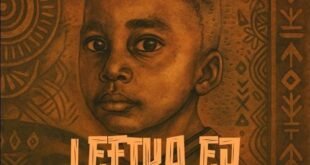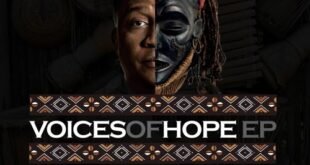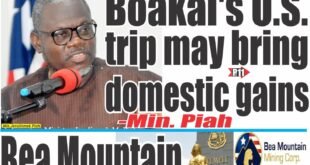Sarpo National Park in Sinoe County, southeast Liberia, faces threats from illegal miners and other activities, County Superintendent Peter Wleh Nyensuah alarms.
By Stephen G. Fellajuah
Sinoe, Liberia, May 2, 2025 – Sinoe County Superintendent Peter Wleh Nyensuah has tearfully sent out a passionate plea for intervention to save the Sapo National Park, Liberia’s largest and only national rainforest reserve, describing current state of the park as “a very damaging mood.”
The emotional appeal followed his recent county-wide tour, during which he witnessed the scale of illegal activities and environmental destruction plaguing the once-pristine wilderness. From illegal gold mining operations to poaching and unchecked encroachment, the park is quickly losing its status as a sanctuary for some of West Africa’s rarest species.
Speaking with reporters, Superintendent Nyensuah lamented, “This is the one and only reserved part of Liberia, and it is falling apart before our eyes”, and cautioned, “If we don’t act now, we will lose it forever.”
Spanning more than 1,800 square kilometers, Sapo National Park is Liberia’s oldest protected area and one of the most ecologically rich regions in West Africa. It is home to hundreds of plant and animal species found nowhere else on Earth, including endangered forest elephants and the elusive pygmy hippopotamus.
But its remoteness and lack of consistent enforcement have made it a prime target for illegal mining, hunting, and logging. These human pressures are rapidly destroying habitats, polluting rivers, and displacing both wildlife and indigenous communities that have lived in harmony with the forest for generations.
“This park is not just a patch of forest,” Nyensuah emphasized. “It is a global treasure, a climate safeguard, and a sacred trust for future generations.”
The urgency of Nyensuah’s plea was further underscored by a recent tragedy that sent shockwaves through the region. According to unconfirmed reports, at least twelve people are feared trapped in a collapsed mining pit located deep within the park’s interior, Sinoe County, Southeast of Liberia. The individuals had allegedly defied multiple warnings to vacate the protected area.
According to report, local authorities say the incident highlights the lawlessness and danger that have become commonplace inside Sapo National Park, where illegal operators are now acting with apparent impunity.
“This is no longer just about the forest,” an environmentalist said on condition of anonymity. “It’s about human life, national security, and the future of our environment.”
Superintendent Nyensuah is calling on President Joseph Boakai, lawmakers, the Environmental Protection Agency (EPA), and international partners to intervene urgently. His proposed measures include deployment of military-backed security forces to patrol the park and expel illegal occupants.
He also wants an immediate investigation into the collapsed mining pit and prosecution of those responsible, including deployment of trained forest rangers equipped to enforce conservation laws.
Sustainable development initiatives to support local communities with alternative livelihoods such as eco-tourism, agriculture, and education programs.
He also stressed a need for national education campaign to rekindle environmental awareness and responsibility among Liberians.
While Nyensuah’s emotional breakdown may have unfolded quietly in the forested heart of Sinoe, its message has the power to echo across the entire nation and beyond. His tears reflect not only grief but a profound love for country, nature, and the generations to come.
Environmentalists and civil society groups have echoed his call, urging the government to treat the situation in Sapo as a national emergency.
“We stand with Superintendent Nyensuah,” said Amelia Togbah, director of the Liberian Environmental Alliance. “Sapo is not just dying, it is crying for help. And if we do not listen, history will not forgive us.”
As Liberia grapples with challenges ranging from economic recovery to governance, the fate of Sapo National Park is becoming a symbol of the nation’s broader struggle to balance development with sustainability. Editing by Jonathan Browne
 JamzNG Latest News, Gist, Entertainment in Nigeria
JamzNG Latest News, Gist, Entertainment in Nigeria









